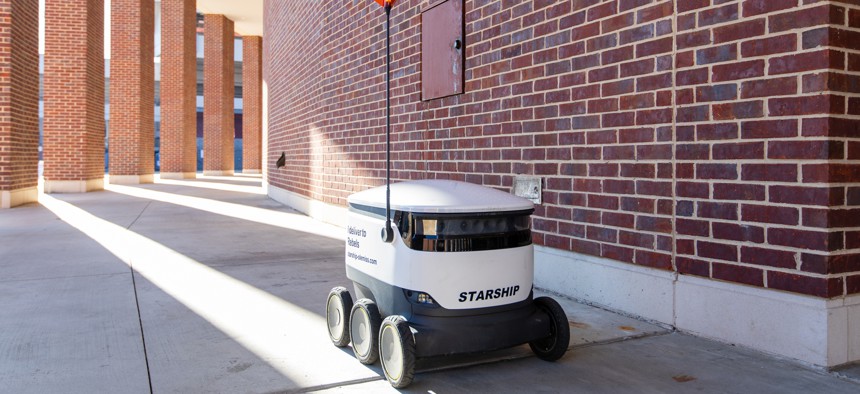Food Delivery Robots Gaining Popularity

iStock.com/CRobertson
The emerging technology poses regulatory questions for state and local governments.
Businesses were already testing out food delivery robots in limited numbers before the coronavirus hit, but labor shortages and a rising interest in contactless delivery options during the pandemic accelerated their deployment, makers of the technology and others say.
As more of the robots appear, state and local governments have been coming up with regulations to guide how the machines can go about their business. As with other emerging technologies, this can involve a balancing act, taking into account issues like public safety, while also trying to allow for innovation. There are also matters of state versus local control in play.
The robots are now roaming college campuses and city sidewalks around the U.S., The Associated Press recently reported. “We saw demand for robot usage just go through the ceiling,” Alastair Westgarth, the CEO of Starship Technologies recently told AP. “I think demand was always there, but it was brought forward by the pandemic effect.”
Starship manufactures robots for food and package delivery. The machines from Starship and other companies vary in size, with models checking in at around two feet high, give or take a few inches, and often looking somewhat like a jumbo size cooler on wheels. They can operate autonomously, with human overseers watching them remotely.
The personal delivery devices allow for “touchless” delivery options, where people don’t need to interact in person, a potential upside during the pandemic.
“I think Covid-19 gave an opportunity to see some of the benefits that personal delivery devices could bring to communities,” said Lena Geraghty, program director of urban innovation at the National League of Cities. “They enabled residents to get needed resources like food without having that close personal contact with someone else who could potentially transmit Covid.”
"With the robots, you don't necessarily have to be at home to receive a delivery, so you have a little bit more control about seeing where this device is and how it's making its way to you,” Geraghty said. “It’s also kind of like a cool thing, so people like the novelty of it, which is also encouraging cities to explore the potential and pilots.”
While having food delivered by a robot or a driverless car is something most Americans have not experienced, it’s an idea that is increasingly piquing their interest. And about four in 10 consumers surveyed said they would use autonomous delivery if it was available, according to a 2019 report from The National Restaurant Association and Technomic.
Regulating Robotic Deliveries
In 2017, Virginia became the first state to pass a law allowing robots to make home and office deliveries. Idaho was the second. Lawmakers in both states worked with Starship Technologies to draft the legislation. Other states are considering similar measures.
Virginia in 2020 updated its laws, increasing the robots weight limit from 50 to 500 pounds, and requiring localities to allow the machines to operate on the sides of a roadway where sidewalks are not available—with certain conditions and safety restrictions in place.
According to NLC’s Geraghty, there are five key areas that policy makers may want to consider when developing pilot programs to allow for delivery robots:
- Permitting process for companies that want to start using these devices within city limits.
- Insurance requirements for companies manufacturing the robots to pay for any third party damage these devices might cause.
- Zones where the machines are allowed and not allowed to operate.
- Speed and height restrictions.
- How to gather information from companies operating the robots.
Action at the Local Level
Fairlawn, Ohio, a city of about 7,500 near Akron, offers one example of how cities are coming up with robot rules of the road.
To operate a “personal delivery device” there on sidewalks, or in crosswalks, the robot must weigh no more than 90 pounds and must have a maximum speed of 10 mph. The city also requires a light be placed on the front and rear of the robot that is visible in clear weather from a distance of at least 500 feet when directly in front of a vehicle’s low-beam headlights.
Redwood City, California, requires delivery devices that robots traveling on sidewalks and in crosswalks alert the operator if certain technology failures occur.
A Starship representative said in a statement that the company only provides “service in areas where our robots have received approval from the local government and community groups.”
NLC’s Geraghty noted that some states have blocked local governments from regulating the machines. But there are reasons, she added, why tailoring the rules to local needs can make sense. “I think a sidewalk robot in Los Angeles is probably different from a sidewalk robot in a smaller urban or suburban area,” Geraghty said.
Andre Claudio is the assistant editor for Route Fifty.
NEXT STORY: How One City is Working to Make Spending Data More Transparent





